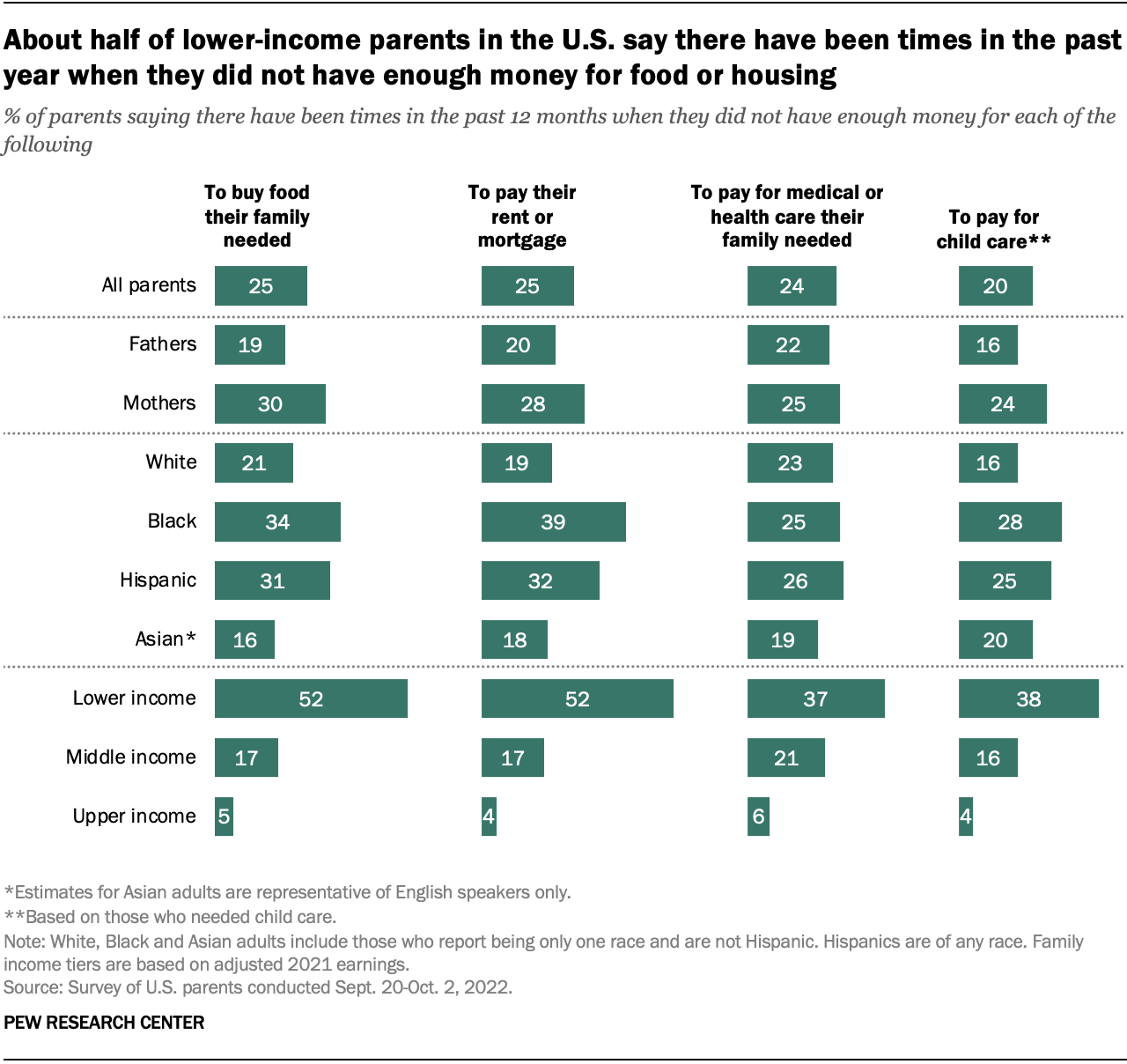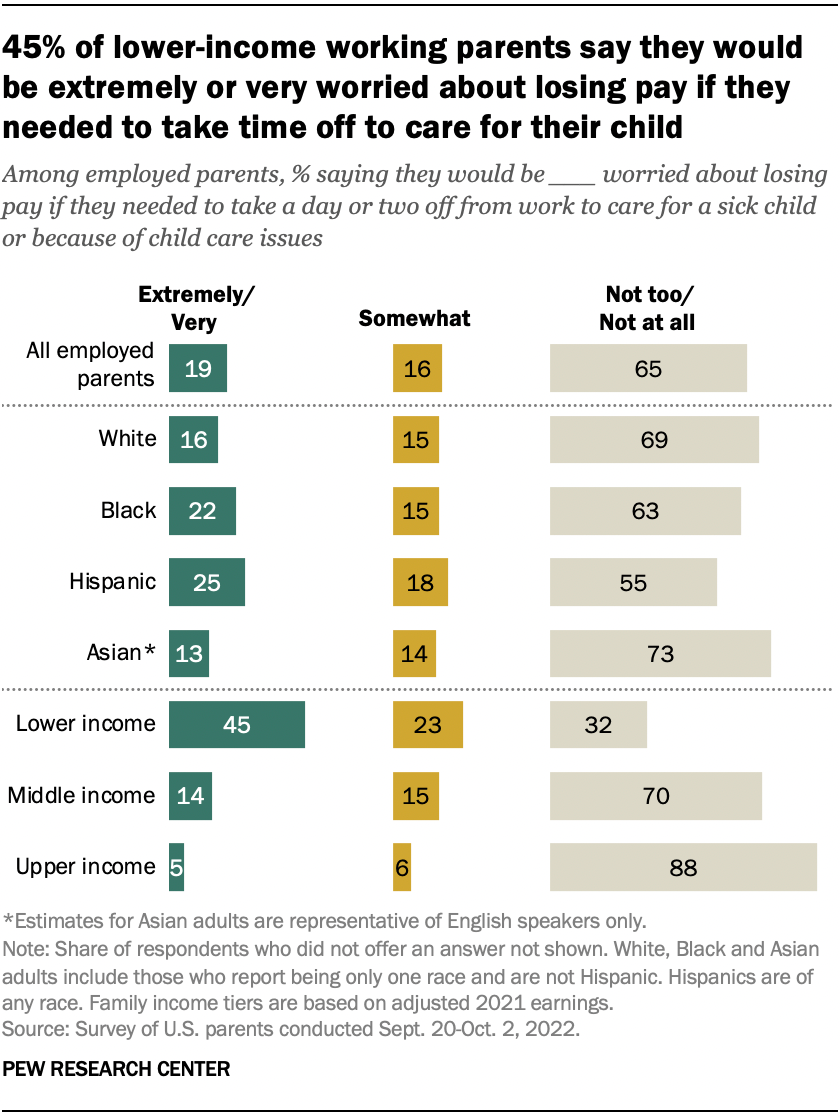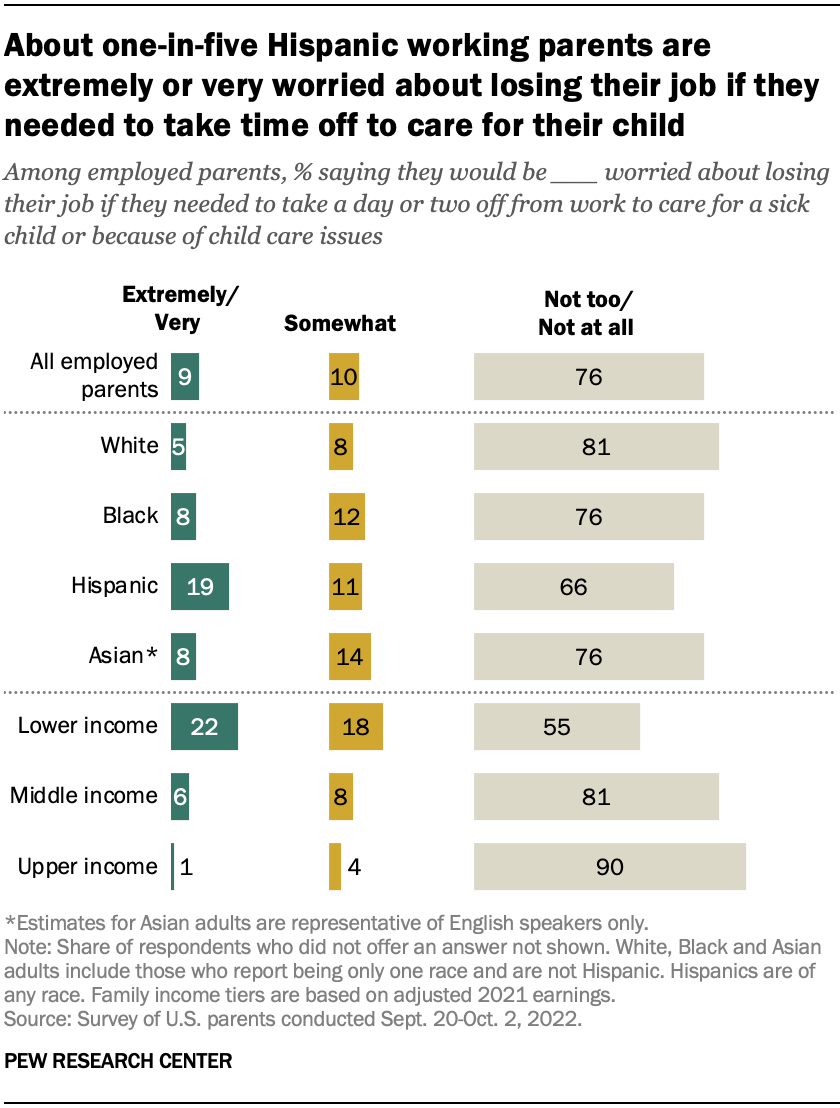Amid soaring inflation rates and signs that the economy is approaching a recession, one-in-four U.S. parents say there have been times in the past year when they could not afford food their family needed or to pay their rent or mortgage. A similar share (24%) say they have struggled to pay for health care their family needed, and 20% of those who needed child care say they haven’t always had enough money to pay for it, according to a recent Pew Research Center survey.
Pew Research Center conducted this analysis to study the economic challenges of U.S. parents. To do this, we surveyed 3,757 U.S. parents with at least one child younger than 18, including 2,941 parents who are employed part time or full time. Most parents who took part are members of the Center’s American Trends Panel (ATP), an online survey panel that is recruited through national, random sampling of residential addresses. This survey also included an oversample of Black, Hispanic and Asian parents from Ipsos’ KnowledgePanel, another probability-based online survey web panel recruited primarily through national, random sampling of residential addresses.
Address-based sampling ensures that nearly all U.S. adults have a chance of selection. The survey is weighted to be representative of the U.S. adult population by gender, race, ethnicity, partisan affiliation, education and other categories. Read more about the ATP’s methodology.
Here are the questions used for the report, along with responses, and its methodology.
Another source of financial stress for many working parents: unexpected child-related emergencies that require time off from work. About one-in-five parents who work at least part time (19%) say they would be extremely or very worried about losing pay if they needed to take a day or two off work because of child care issues, and 9% say they’d be equally worried about losing their job.

Lower-income parents are much more likely to say there have been times in the past year when they did not have enough money for basic needs. About half of lower-income parents (52%) say they have not had enough money for food or their rent or mortgage. By comparison, 17% of middle-income parents say the same about each of these items, while 5% of upper-income parents say they have struggled to pay for food and 4% for rent or a mortgage.
Some 37% of lower-income parents say they have struggled to pay for medical or health care for their families at some point in the past year, compared with 21% of middle-income and just 6% of upper-income parents. Among those who needed child care, 38% of lower-income parents say there have been times in the past year when they didn’t have enough money to pay for it. Much smaller shares of middle-income (16%) and upper-income parents (4%) say the same.
Black and Hispanic parents, who tend to have lower incomes than their White and Asian counterparts, are especially likely to say there have been times in the last year when they could not afford food or housing. About four-in-ten Black parents (39%) say they have struggled to pay their rent or mortgage in the past year, higher than the share of Hispanic (32%), White (19%) and Asian parents (18%) who say the same.
Black (34%) and Hispanic parents (31%) are also more likely than White (21%) and Asian parents (16%) to say they have not had enough money for food their family needed in the past year.
Three-in-ten mothers – compared with 19% of fathers – say there have been times in the past year when they did not have enough money to buy food. Mothers are also more likely than fathers (28% vs. 20%) to say there have been times when they did not have enough money to pay their rent or mortgage. And while 24% of mothers who needed child care say there were times in the past year when they weren’t able to afford it, a smaller share of fathers (16%) say the same.
Among mothers, experiences differ by living arrangements and marital status. Half of cohabiting mothers – that is, those who are living with an unmarried partner – and 45% of those who are unpartnered say there have been times in the past year when they didn’t have enough money for food. A much smaller share of married mothers (21%) say the same.
Similarly, 52% of cohabiting mothers and 44% of unpartnered mothers say there have been times when they didn’t have enough money for their rent or mortgage, compared with 19% of those who are married. These patterns are similar when it comes to mothers’ experiences with paying for medical and child care. (There weren’t enough cohabiting or unpartnered fathers in the sample to analyze separately.)
Some working parents worry about losing pay – or their job – in the event of child care emergencies
Overall, 19% of parents who work at least part time say they would be extremely or very worried about losing pay if they needed to take a day or two off work to care for a sick child or because of child care issues, according to the same survey. Roughly one-in-ten (9%) would be extremely or very worried about losing their job if they needed to take a day or two off from work for these reasons.

There are significant demographic differences within the share of working parents who are extremely or very worried about these possibilities.
Some 45% of employed parents with lower incomes say they would be extremely or very worried about losing pay if they needed to take a day or two off from work to deal with a sick child or because of child care issues. Relatively small shares of working parents with middle (14%) or upper (5%) incomes say the same. In fact, most middle- and upper-income working parents say they wouldn’t worry about this too much or at all (70% and 88%, respectively, compared with 32% of those with lower incomes).
Working parents with lower incomes (22%) are also more likely than those with middle (6%) and upper (1%) incomes to say they would be extremely or very worried about losing their job if they needed to miss a day or two of work for child care issues. Conversely, overwhelming majorities of middle-income (81%) and upper-income parents (90%) say they would be not too or not at all worried about losing their job, compared with 55% of lower-income parents.

Black (22%) and Hispanic working parents (25%) are more likely than White (16%) and Asian parents (13%) to say they would be extremely or very worried about losing pay if they needed to take a day or two off work because of child care issues. Hispanic parents are much more likely than other parents to say they are extremely or very worried about losing their job: 19% say this, compared with 8% of Black and Asian parents and 5% of White parents.
Mothers who are employed are more likely than fathers (24% vs. 14%) to say that they would be extremely or very worried about losing pay if they needed to take a day or two off from work for child care issues. Mothers are also more likely than fathers (11% vs. 7%) to say they would be extremely or very worried about losing their job. Larger shares of fathers than mothers say they wouldn’t be too worried or wouldn’t be worried at all about losing pay or losing their job in these circumstances.
Note: Here are the questions used for the report, along with responses, and its methodology.
